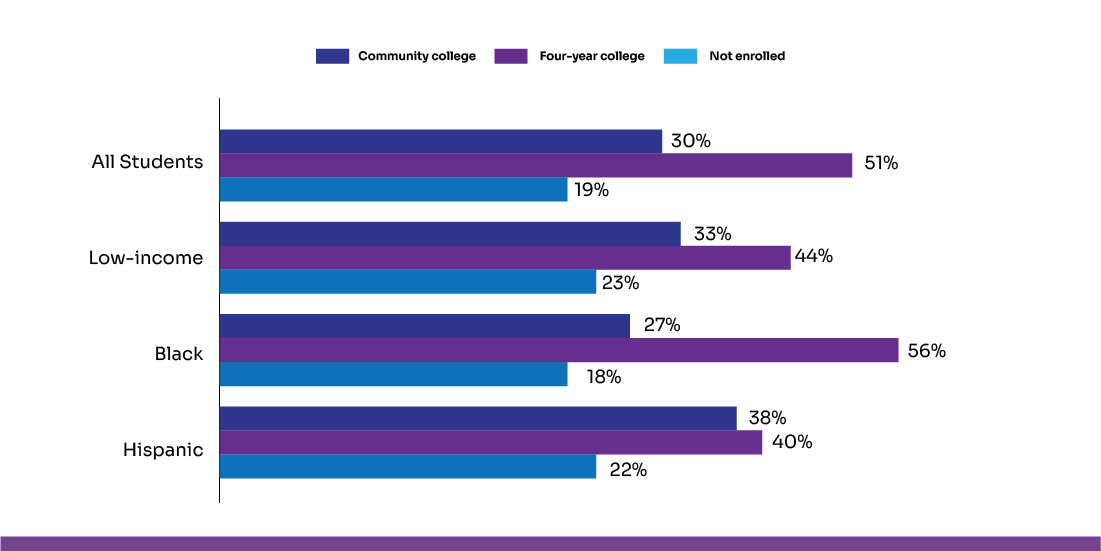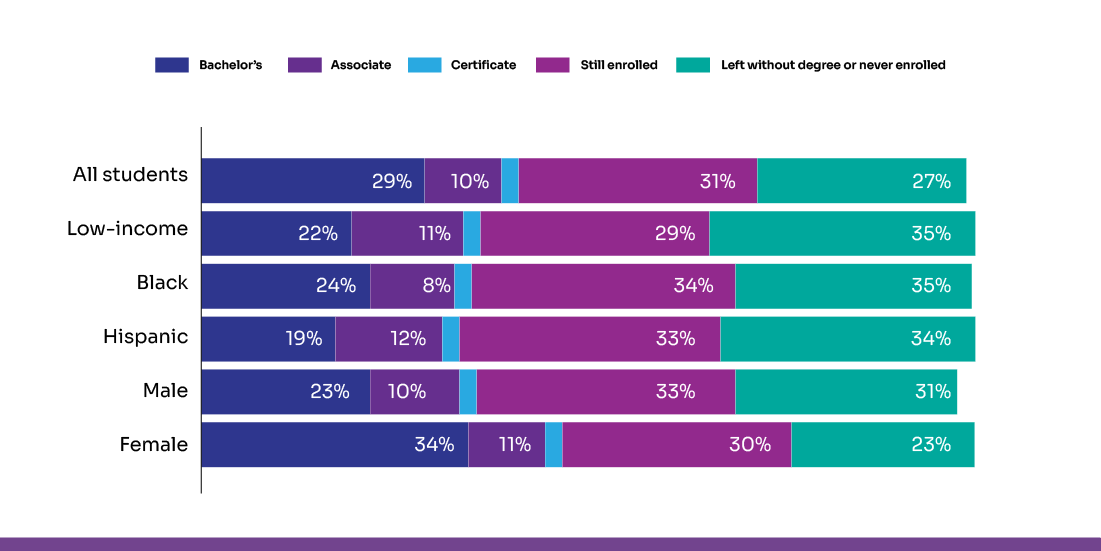College credits aren’t just numbers—they represent the time, effort, and knowledge you invest in every course. From gen ed requirements to electives and your major classes, each credit counts toward graduation. But there are also flexible ways to earn credits faster, like AP courses, dual enrollment, online programs, or CLEP exams.
Table Of Contents
- 1What Are College Credits & Smart Ways to Earn Them
- 2What Are College Credits?
- 3How Are College Credits Calculated?
- 4Types of College Credits Students Can Earn
- 5How Are College Credits Earned?
- 6How Many Credits Are Required Per Semester?
- 7How Are Credits Calculated Per Subject?
- 8How Many College Credits Do You Need to Graduate?
- 9Importance of Earning College Credits
- 10How College Credits Affect Financial Aid
- 11Conclusion
What Are College Credits & Smart Ways to Earn Them
College credits are the building blocks of your degree, acting as academic currency that tracks your progress through a program. Typically, you’ll need around 120 credits for a bachelor’s and 180 credits for a master’s degree. But here’s the catch—nearly 40% of students lose some credits during transfer, according to recent reports, which can delay graduation and increase tuition costs.
Understanding what college credits are, how they’re earned, and how to maximize them can save time and money—and even help you graduate early. In this blog, we’ll break down the meaning of college credits and explore 10 practical ways to earn them faster, whether you’re just starting college or planning to transfer.
What Are College Credits?
College credits are units used by colleges and universities to measure the amount of learning or academic work you complete in a course. These credits help track your progress toward completing a degree.
How Are College Credits Calculated?
College credits are based on both class time and study time.
According to U.S. federal guidelines:
- 1 credit hour = 1 hour of classroom learning + 2 hours of homework per week. So, for a typical 3-credit course, you would:
- Attend 3 hours of class each week
- Spend about 6 hours on assignments and studying
This adds up to around 9 hours per week per course, usually over a 15-week semester. These credits help track academic progress, determine eligibility for financial aid, and allow for easier transfer between accredited institutions
Types of College Credits Students Can Earn
College credits come in many forms and can be earned through traditional coursework, exams, life experience, or alternative education paths. Here’s a breakdown of the most common types of credits students can acquire:
1. Standard Course-Based Credits
These are the most common type of credits, earned by completing individual college or university courses. Each course typically awards a set number of credit hours, usually based on weekly classroom hours over a semester.
2. Transferred Credits from Other Institutions
When students switch colleges—such as moving from a community college to a four-year university—they can often bring their previously earned credits with them, depending on compatibility. In Fall 2024, 1.2 million students transferred to a new institution, making up about 13% of non-first-year undergraduates. This shows how common and valuable transfer credits are in continuing academic progress. With Edmo’s Document Intelligence, students can get a complete transfer credit evaluation in under 4 hours, ensuring faster decisions, smoother transitions, and no lost progress.
3. Advanced Placement (AP) Exam Credits
High school students can earn credits by scoring well on Advanced Placement (AP) exams. Colleges typically award credits for AP exam scores of 3 or higher, though policies vary by institution.
4. International Baccalaureate (IB) Program Credits
The International Baccalaureate (IB) Diploma Programme allows high school students to earn college credit for high scores on IB exams. Many universities recognise IB as an advanced academic curriculum.
5. College-Level Examination Program (CLEP) Credits
CLEP exams allow students to test out of introductory-level college courses. This is particularly beneficial for adult learners or students with strong subject knowledge through self-study or work experience.
6. Credits Through Prior Learning Assessment (PLA)
Prior Learning Assessment (PLA) allows students to earn college credits for knowledge gained outside traditional classrooms—like from work experience, military service, or self-study. Students may need to submit portfolios or pass exams. Notably, 46% of institutions expanded PLA pathways, and 48% increased credit awards in recent years, making this a growing credit-earning option.
7. Dual Enrollment Program Credits
High school students can earn college credits early by enrolling in dual enrollment programs, where they take college-level courses alongside their regular curriculum. These classes are usually held at their high school or a nearby college. According to a 2024 study by the Community College Research Center, dual enrollment participation rose by 18% between 2021 and 2023, showing its growing popularity among students preparing for college.
8. Internship and Experiential Learning Credits
Some colleges award credits for internships, cooperative education (co-op), and hands-on learning experiences. Students gain practical experience while earning academic credit tied to their major or field of study.
9. Credits Earned from Study Abroad Programs
Students who participate in approved study abroad programs can earn academic credits for coursework completed overseas. These credits are usually pre-approved and transferred back to the home institution upon return.
10. Online and Distance Learning Credits
Many universities now offer online or hybrid courses that award the same credits as in-person classes. In Fall 2024 alone, over 800,000 Cal State and 100,000 UC students enrolled in online courses. Studies show that student outcomes in many of these courses matched—or even outperformed—traditional classroom results, making online credits a flexible and effective option.
How Are College Credits Earned?
You earn credits by successfully completing courses. But it’s important to choose your courses wisely.
- Your major (main subject) will decide which courses you must complete.
- You can still explore other interests (like art or design), but the major requirements must come first.
For example:
- If you’re majoring in physics, most of your credits must come from physics-related courses.
- You can still take art or fashion design courses—but they’ll count as electives, not core credits.
How Many Credits Are Required Per Semester?
To graduate with a bachelor’s degree, most universities require around 120 credits.
This typically means:
- 30 credits per year
- 15 credits per semester
- 5 courses per semester (each worth 3 credits)
Each course covers the full subject in one semester. So, instead of spreading out chapters over the year, you complete the entire course in that one term..
How Are Credits Calculated Per Subject?
Credits are based on the time spent in class and studying outside of class. Here’s how it typically works:
1 Credit = 1 hour of classroom instruction + 2 hours of homework per week, over a 15-week semester.
Most Courses = 3 Credits
That means:
- 3 hours of class per week
- 6 hours of homework/study time
- Over a 15-week semester
So, to earn 3 credits, you need to commit about 9 hours per week to the course.
How Many College Credits Do You Need to Graduate?
To earn a bachelor’s degree, most students need to complete at least 120 credit hours. But it’s not just about hitting that number—you need to meet specific credit requirements across three key areas:
1. General Education (Gen Ed) Requirements
In your first two years, you’ll focus on gen ed courses in subjects like math, science, writing, and humanities. These courses typically make up about half of your total credits. For example, at Central Connecticut State University, gen ed alone requires 41–46 credits, which is around 40% of a bachelor’s degree.
2. Major Requirements
By the end of your second year, you’ll usually declare your major. From then on, you’ll take advanced courses in your chosen field, which can make up one-third to half of your total credits, depending on the major.
3. Electives
The remaining credits come from electives—courses you choose based on your interests. These offer flexibility and the chance to explore new areas. Smart electives can even complement your major. For example, a biology major might take an acting class to improve public speaking for presentations.
Importance of Earning College Credits
College credits are the stepping stones to earning a degree. They show what you’ve completed, help track your progress, and decide your class level or scholarship chances. Earning credits early—through dual enrollment or past learning—can save time, cut costs, and make your college journey smoother and faster.
1. Boosts College Enrollment
College credits earned during high school significantly enhance the likelihood of students enrolling in college immediately after graduation. These early credits not only prepare students academically but also give them a head start in the college journey. According to the Community College Research Center, over 50% of students with high school college credits enrolled in postsecondary education right after graduation, and they were twice as likely to attend a four-year college compared to a two-year one.

2. Saves Time and Reduces Costs
College credits earned through prior learning or dual enrollment can significantly lower both the cost and duration of a degree. According to Higher Learning Advocates, students who receive such credits save between $1,500 and $10,200 on tuition and reduce their time to graduation by nearly seven months. These students are also 17% more likely to graduate, making early credit a valuable academic and financial advantage.
3. Increases Chances of Timely Graduation
Students who earn credits in high school are more likely to complete their postsecondary education on time. A study by the Community College Research Center found that over 40% of students with early college credits earned a degree or certificate within four years, highlighting how these credits help maintain academic momentum and reduce delays in graduation.

4. Prevents Delays and Financial Loss
Proper transfer of college credits is crucial to staying on track for graduation and avoiding unnecessary expenses. When students lose credits during a transfer, it disrupts their academic progress and leads to delays. On average, losing transfer credits can delay graduation by three months and cost around $15,400 in lost wages. Ensuring smooth credit transfer helps maintain momentum and reduces both time and financial burdens.
5. Improves Academic Progress Tracking
College credits serve as clear, measurable indicators of a student’s academic progress. They are used to determine class standing (such as freshman or sophomore) and eligibility for academic honors or financial aid. For example, at Central Michigan University, students must complete at least 30 new credit hours each academic year to retain their merit-based scholarships. This shows how credit accumulation directly influences a student’s academic standing and continued financial support.
How College Credits Affect Financial Aid
Your college credits don’t just track your progress—they also affect your financial aid. If you’re planning to receive federal or institutional aid, the number of credit hours you take each semester plays a big role.
- Full-time students (12+ credit hours): Eligible for full financial aid, including maximum Pell Grants and student loans.
- Part-time students (less than 12 credit hours): May receive reduced aid or limited access to certain programs.
Some colleges have specific rules, so always check with your school’s financial aid office to understand their policy on academic progress and credit requirements.
Conclusion
Understanding what college credits are and how to earn them is essential for navigating your academic journey with clarity and confidence. College credits are more than just numbers—they’re a measure of your progress, a reflection of your hard work, and the key to unlocking your degree goals.
By knowing the different ways to earn college credit—whether through traditional classes, AP exams, online courses, or study abroad programs—you can plan smarter, save time, and even cut down on college costs.









No comments yet. Be the first to comment!
Leave a Comment